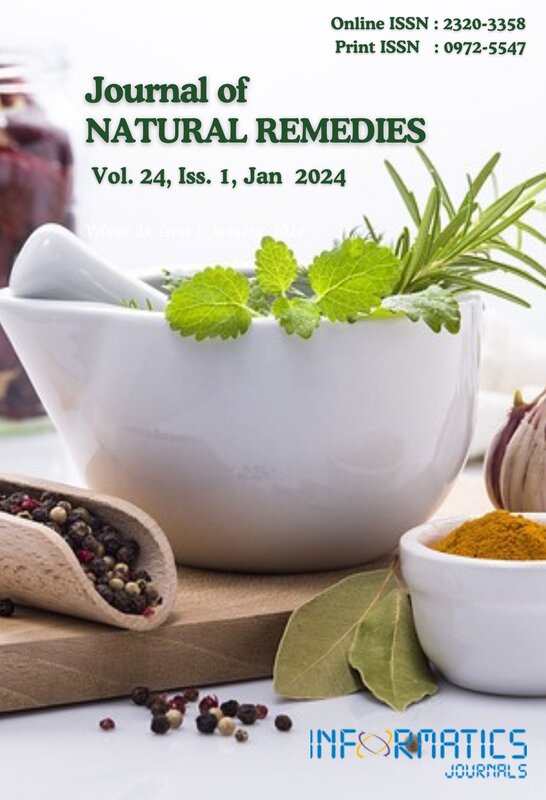Potency of Clitoria ternatea L. Ethanol Extract Against IFNγ and GLUT4 Protein in Type 2 Diabetes Mellitus Rat Model
DOI:
https://doi.org/10.18311/jnr/2024/32205Keywords:
Clitoria ternatea, Diabetes Mellitus, IFNγ, Immunohistochemistry, GLUT4Abstract
Diabetes Mellitus (DM) is a chronic disease caused by genetics, lifestyle, and immunology. Type 2 DM is caused by resistanceto insulin, which causes blood sugar to not be stored in glycogen. Clitoria ternatea L. (Fabaceae) flower contains a lot ofanthocyanins and has long been used in various traditional medicines. They are believed to treat fever, inflammation, anddiabetes. Anthocyanins have antidiabetic, anticancer, anti-inflammatory, and anticancer properties. This study aimed toevaluate anti-DM of Clitoria ternatea L. flower extract (CTE) in DM model rats with parameters such as liver weight ratio,IFNγ, and GLUT4 protein expression in pancreas and femoral muscle. Rats with a streptozotocin-induced (STZ) DM modelwere used to test the effects of oral administration of CTE at doses of 200, 400, and 800 mg/kg BW, glybenclamide (0.45mg/kg BW), and simvastatin (0.9 mg/kg BW). After blood sugar levels were >200 mg/dL, the rats were given various dosesof CTE and tested for protein expression of IFNγ and GLUT4 in femoral muscle by immunohistochemistry (IHC) method.Data analysis used ANOVA and continued with Tukey’s post hoc test. Results showed that CTE could increase liver ratiowhile decreasing IFNγ activation at CTE 400 mg/kg BW and upregulating GLUT4 at 400 mg/kg BW. CTE has an anti-DM activity potential for diabetes mellitus treatment due to its anthocyanin content.
Downloads
Metrics
Downloads
Published
How to Cite
Issue
Section
License
Copyright (c) 2024 Philips Onggowidjaja, Rita Tjokropranoto, Richard Gunawan, Wahyu Widowati, Hanna Sari Widya Kusuma, Faradhina Salfa Nindya (Author)

This work is licensed under a Creative Commons Attribution 4.0 International License.
Accepted 2023-10-17
Published 2024-01-01
References
King Aileen JF. The use of animal models in diabetesresearch. Br J Pharmacol. 2012; 166:877-894. https://doi.org/10.1111/j.1476-5381.2012.01911.x DOI: https://doi.org/10.1111/j.1476-5381.2012.01911.x
Marín-Peñalver JJ, Martín-Timón I, Sevillano-Collantes C,del Cañizo-Gómez FJ. Update on the treatment of type 2diabetes mellitus. World J Diabetes. 2016; 7(17):354-395.https://doi.org/10.4239/wjd.v7.i17.354 DOI: https://doi.org/10.4239/wjd.v7.i17.354
Pragallapati S, Manyam R. Glucose transporter 1 in healthand disease. J Oral Maxillofac Pathol. 2019; 23(3):443-449.https://doi.org/10.4103/jomfp.JOMFP_22_18 DOI: https://doi.org/10.4103/jomfp.JOMFP_22_18
Wang T, Wang J, Hu X, Huang XJ, Chen GX. Currentunderstanding of glucose transporter 4 expression andfunctional mechanisms. World J Biol Chem. 2020; 11(3):76-98. https://doi.org/10.4331/wjbc.v11.i3.76 DOI: https://doi.org/10.4331/wjbc.v11.i3.76
Mora S, Pessin J. Glucose/sugar transport in mammals.In Encyclopedia of Biological Chemistry: Second Edition.Elsevier Inc. 2013; p. 391-394. https://doi.org/10.1016/B978-0-12-378630-2.00041-4 DOI: https://doi.org/10.1016/B978-0-12-378630-2.00041-4
Olson AL. Regulation of GLUT4 and insulin-dependentglucose flux. ISRN Mol Biol. 2012; 2012:856987. https://doi.org/10.5402/2012/856987 DOI: https://doi.org/10.5402/2012/856987
Gołąb J, Jakóbisiak M, Lasek W, Stokłosa T. Immunologia.Nowe Wydanie. Wydawnictwo Naukowe PWN SA,Warszawa. 2014; p. 179-184.
Nair V, Bang WY, Schreckinger E, Andarwulan N, Cisneros-Zevallos L. Protective role of ternatin anthocyanins andquercetin glycosides from butterfly pea (Clitoria ternatea Leguminosae) blue flower petals against lipopolysaccharide(LPS)-induced inflammation in macrophage cells. J AgricFood Chem. 2015; 63(28):6355-65. https://doi.org/10.1021/acs.jafc.5b00928 DOI: https://doi.org/10.1021/acs.jafc.5b00928
Maneesai P, Chaihongsa N, Iampanichakul M, Meephat S,Prasatthong P, Bunbupha S, Wunpathe C, Pakdeechote P.Clitoria ternatea (Linn.) flower extract attenuates vasculardysfunction and cardiac hypertrophy via modulation ofAng II/AT1R/TGF-β1 cascade in hypertensive rats. J SciFood Agric. 2022; 102:2253-2261. https://doi.org/10.1002/jsfa.11563 DOI: https://doi.org/10.1002/jsfa.11563
Oguis GK, Gilding EK, Jackson MA, Craik DJ. Butterflypea (Clitoria ternatea), a cyclotide-bearing plant withapplications in agriculture and medicine. Front Plant Sci.2019; 10:645. https://doi.org/10.3389/fpls.2019.00645 DOI: https://doi.org/10.3389/fpls.2019.00645
Gondokesumo ME, Pardjianto B, Sumitro SB, WidowatiW, Handono K, et al. Xanthones analysis and antioxidantactivity analysis (applying ESR) of six different maturitylevels of mangosteen rind extract (Garcinia mangostanaLinn.). Pharmacog J. 2019; 11(2):369-373. https://doi.org/10.5530/pj.2019.11.56 DOI: https://doi.org/10.5530/pj.2019.11.56
Widowati W, Darsono L, Lucianus J, Setiabudi , Obeng SS,Stefani S, et al. Butterfly pea flower (Clitoria ternatea L.)extract displayed antidiabetic effect through antioxidant,anti-inflammatory, lower hepatic GSK-3β, and pancreaticglycogen on Diabetes Mellitus and dyslipidemia rat. J KingSaud Univ. Sci. 2023;35(4):102579. http://creativecommons.org/licenses/by-nc-nd/4.0/ DOI: https://doi.org/10.1016/j.jksus.2023.102579
Widowati W, Ratnawati H, Mozef T, Pujimulyani D,Yellianty Y. Hypolipidemic and antioxidant effects of blacktea extract and quercetin in atherosclerotic rats. Int J MedPharm Sci Eng. 2013; 7(10):1-8.
Elamin NMH, Fadlalla IMT, Omer SA, Ibrahim HAM.Histopathological alteration in STZ-nicotinamide diabeticrats, a complication of diabetes or a toxicity of STZ? Int J DiabClin Res. 2018; 5(3):1-9. https://doi.org/10.23937/2377-3634/1410091 DOI: https://doi.org/10.23937/2377-3634/1410091
Florence NT, Benoit MZ, Jonas K, Alexandra T, Désiré DDP,Pierre K, Théophile D. Antidiabetic and antioxidant effectsof Annona muricata (Annonaceae), aqueous extract onstreptozotocin-induced diabetic rats. J Ethnopharm. 2014;151(2):784-790. https://doi.org/10.1016/j.jep.2013.09.021 DOI: https://doi.org/10.1016/j.jep.2013.09.021
Akca G, Eren H, Tumkaya L, Mercantepe T, HorsanaliMO, Deveci E, et al. The protective effect of astaxanthinagainst cisplatin-induced nephrotoxicity in rats. BiomedPharmacother. 2018; 100:575-582. https://doi.org/10.1016/j.biopha.2018.02.042 DOI: https://doi.org/10.1016/j.biopha.2018.02.042
Pang M, Fang Y, Chen S, Zhu X, Shan C, Su J, et al.Gypenosides inhibit xanthine oxidoreductase andameliorate urate excretion in hyperuricemic ratsinduced by high cholesterol and high-fat food (lipidemulsion). Med Sci Mon. 2017; 23(2017):1129-1140.https://doi.org/10.12659/MSM.903217 DOI: https://doi.org/10.12659/MSM.903217
Magalhães DA, Kume WT, Correia FS, QueirozTS, Allebrandt Neto EW, Santos MPD, KawashitaNH, França SA. High-fat diet and streptozotocinin the induction of type 2 diabetes mellitus: a newproposal. An Acad Bras Cienc. 2019; 91(1):e20180314.https://doi.org/10.1590/0001-3765201920180314 DOI: https://doi.org/10.1590/0001-3765201920180314
Tan T, Xiang Y, Deng C, Cao C, Ren Z, Huang G, et al.Variable frequencies of peripheral T-lymphocyte subsets inthe diabetes spectrum from type 1 diabetes through latentautoimmune diabetes in adults (LADA) to type 2 diabetes.Front Immunol. 2022; 13:974864. https://doi.org/10.3389/fimmu.2022.974864 DOI: https://doi.org/10.3389/fimmu.2022.974864
Yi Z, Li L, Garland A, He Q, Wang H, Katz JD, Tisch R, WangB. IFN-γ receptor deficiency prevents diabetes induction bydiabetogenic CD4+, but not CD8+, T cells. Eur J Immunol.2012; 42(8):2010-8. https://doi.org/10.1002/eji.201142374 DOI: https://doi.org/10.1002/eji.201242374
Habegger KM, Hoffman NJ, Ridenour CM, Brozinick JT,Elmendorf JS. AMPK enhances insulin-stimulated GLUT4regulation via lowering membrane cholesterol. Endocrinol.2012; 153(5):2130-41. https://doi.org/10.1210/en.2011-2099 DOI: https://doi.org/10.1210/en.2011-2099
Kampmann U, Christensen B, Nielsen TS, Pedersen SB,Ørskov L, Lund S, et al. GLUT4 and UBC9 protein expressionis reduced in muscle from type 2 diabetic patients withsevere insulin resistance. PLoS One. 2011; 6(11):e27854.https://doi.org/10.1371/journal.pone.0027854 DOI: https://doi.org/10.1371/journal.pone.0027854
Hematyar J, Rashidi H, Zakerkish M, Payami SP, GhaderianSB. Effect of sitagliptin versus GB on gycemic markers, lipidprofile inflammatory and oxidative stress factors in Type 2diabetes patients: A double-blinded randomized controlledtrial. Maedica (Bucur). 2022; 17(4):762-770. https://doi.org/10.26574/maedica.2022.17.4.762

 Philips Onggowidjaja
Philips Onggowidjaja









 0.35
0.35 24
24 0.161
0.161